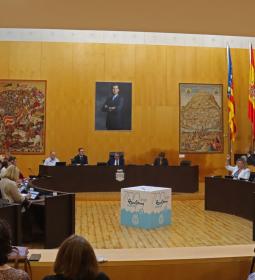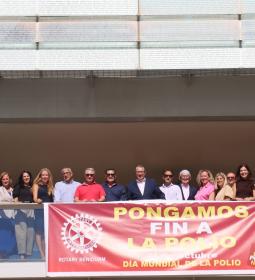The City Council awards the priest the City Medal in the celebration of Constitution Day
Benidorm recognizes Jaume Benaloy for his “selfless work to improve the quality of life of people and the planet”

Toni Pérez affirms that it is “sad and painful that our first legal text is being dynamited by those who negotiate in their own interest an amnesty unknown in the Constitution”
Benidorm City Council today awarded the city's Corporate Medal to Jaume Benaloy Marco, a Benidorm priest assigned by the Orihuela-Alicante Diocese to the Peruvian region of Chimbote to work on different missions in that region. An event that took place during the extraordinary plenary session held on the occasion of the Spanish Constitution Day in the municipal Assembly Hall. The mayor of the city, Toni Pérez, highlighted that he was awarded the distinction “for his selfless work to improve the quality of life of people and our planet” and added that his work “perfectly exemplifies many of the principles included in our Magna Carta, such as the duty to conserve our environment; "the defence of people's quality of life or cooperation and solidarity between regions."
Born in Benidorm in December 1974, Jaume Benaloy Marco has a doctorate in Educational Sciences from the Universidad Católica Los Ángeles de Chimbote; a Theologian specialising in interreligious dialogue from the Pontifical Lateran University of Rome; and a diploma in Social Work from the University of Alicante, in addition to having an extensive pastoral and educational career in public and private institutions in both Spain and Peru. He was ordained as a priest of the Catholic Church in June 1999. After visiting different parishes in the province and training for a time in Rome, in June 2008 the then Bishop of the Diocese of Orihuela-Alicante, Mons. Rafael Palmero Ramos, appointed to work in the missions of the diocese of Chimbote, a Peruvian region of about 900,000 inhabitants, whose main livelihood is fishing, to carry out different works of evangelization and help to those most in need, paying special attention to the great social and environmental of it.
Last October marked 15 years since this priest from Benidorm undertook what he has described on many occasions as the “most rewarding mission of his life” and where he has been able to carry out many teaching and solidarity projects, aimed especially at improving the quality of life of the people of this district of Peru and promote its environmental regeneration.
The mayor has presented the presentation of the Corporate Medal to the parents of Jaume Benaloy, who from Chimbote has sent a video in which he has expressed that receiving such recognition “is an honour and a great responsibility that I receive with gratitude from my esteemed town of Benidorm”. Benaloy has confessed to being “still in shock” and admitted that he receives the Medal “for trying to collaborate in strengthening peaceful relations and collaboration between all the peoples of the earth.”
It was in Benidorm, he said, “where I learned to serve and build bridges between everyone,” a city that he defined as “a beautiful laboratory where peaceful relations between all the peoples of the earth can be strengthened.”
Regarding the Constitution, Jaume Benaloy has stated that “we cannot take steps back” and recalled that “that political commitment of '78 made it possible to overcome painful wounds. “We cannot allow ourselves to live without political pluralism.” He has also advocated “learning from mistakes so as not to make them again.”
Regarding his work in Peru, he has also emphasized that “since I arrived, one of my commitments was to raise awareness to stop the pollution of the Bay of Ferrol. "I don't understand why we live with our backs to the sea in Chimbote." And in general, he has opined that "it is time to change uses and consumption to make human life sustainable, a battle that does not involve languages or cultures."
The celebration of Constitution Day in Benidorm was attended by the mayor Toni Pérez, the municipal corporation, the regional secretary of Housing, Sebastián Fernández, the regional deputies Manuel Pérez Fenoll, José Ramón González de Zárate and Mario Villar, the family of Jaume Benaloy, civil authorities and representatives of the State Security Forces and Corps, the queens and ladies of the Festes Majors Patronals, as well as festive, socioeconomic, neighbourhood and cultural entities and associations.
After the presentation of the Corporate Medal, Mayor Toni Pérez read his speech and highlighted that the Constitution “has been and is the foundation of our institutional and political stability” and “has allowed us to create prosperity and well-being.” He has asserted that constitutional Spain, the Spain of today "is the Spain to which the Spanish people always aspired" and has opted for "not admitting the breaking of the rules of the game that we Spaniards gave ourselves, when we agreed on a “a project of lasting coexistence, based on the pillars of the rule of law.” “Defending the Constitution is a noble cause. This is what guarantees that no exclusive model of society is established in Spain,” he added.
At this point, the mayor referred to the amnesty law agreed upon by the Central Government and its partners and indicated that "it is sad and painful to remember that just 37 days ago, while the historic date of the oath of the Constitution by the Princess of Asturias, our first legal text was being dynamited by those who negotiated in their interest an amnesty unknown in the Constitution which, if it prohibits the general pardon, with more reason, does not even contemplate the amnesty that is intended. In his opinion, “what has been achieved in these 45 years, the legacy of harmony of the Transition, cannot be reversed as is being projected in a way that, in my opinion, is humiliating and shameful.”
The mayor has emphasized that the Constitution "contemplates individual pardon, but never a general one, after a final sentence because it does not eliminate the crime", something that, he continued, the amnesty does "which erases and forgets the crime." “And in the situation surrounding this celebration and the Magna Carta, not only was there a crime, but there was a conviction,” he pointed out.
Pérez has also alluded in his speech to the negotiations between the PSOE and “a fugitive from justice who today supports a Government of Spain and who publicly supports ending constitutional principles: 7 votes in an investiture in exchange for amnesty and inequality among Spaniards ”.
The mayor has called this situation “ignominy” and has regretted that “many, betraying their constitutional concept of Spain, have remained silent until now, thus adding to their complicity.”
At that time he pointed out the Benidorm socialist group by stating that "this is how the silences and votes against are understood, in our municipal corporation, in response to the proposal in Plenary to reject the Amnesty Law." For Pérez, "an amnesty like the one proposed now is neither constitutional nor by the Law of the European Union when it is promoted so that those granted amnesty avoid the application of justice."
The mayor of Benidorm concluded by stating that today, more than ever, it is necessary to "remember that in 1978 we Spaniards gave ourselves a rule of law as a system of legal certainty and predictability, where we all have the right to be treated by the decision-making bodies." with dignity, equality and rationality in harmony with the legal system, and to have the opportunity to challenge decisions before independent and impartial courts through a fair process. Without independent judges to interpret and apply the laws to the specific case, there is no possible rule of law.”



































